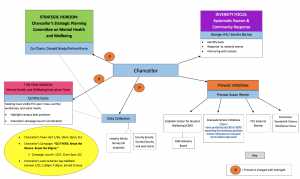For Provost Susan R. Wente, the meaning of mental health and wellness from the university’s standpoint means encouraging a culture of openness and honest discussion about mental health and wellbeing.
“Mental health and wellbeing to us means really having a healthier community that’s very transparent and willing to share with one another what our challenges are and how to help one another, and that mental health and wellbeing does not at all infer that we think everyone has to be, and will be, happy all the time,” Wente said. “We view that there are some very significant and severe mental illnesses that we know faculty, students and our staff suffer from, and then [think about] how do we provide the most accommodating environment in order to help them be successful in their life.”
I think this is something that’s easy to say, ‘Well, it’s not me so I don’t have to be involved.’
To encourage these conversations and continue with the campaign for mental health and wellness on campus, the university will kick off the “GO THERE – Break the Silence, Break the Stigma” campaign. Before the series officially begins on campus, Chancellor Zeppos will hold a discussion about mental health at Town Hall from 10 a.m. to noon on Jan. 26 open to the entire Vanderbilt community. The official kick-off for the campaign will then be on Jan. 27 from 11 a.m. to 2 p.m. in the SLC Ballroom. The event will feature information about campus resources and live demonstrations of well-being practices. The January programming will conclude on Jan. 31 with the Chancellor’s Lecture Series featuring Kay Redfield Johnson, clinical psychologist and writer.
In April 2016, Wente began the conversation about mental health awareness in her newsletter, “The Open Dore.” It addressed the importance of recognizing mental health concerns on campus as well as increasing knowledge about and access to resources to support those struggling with their mental health. Most notably, Wente focused on the idea that mental wellness issues are not only the concern of those struggling with them, but of the entire Vanderbilt community.
“I think this is something that’s easy to say, ‘Well, it’s not me so I don’t have to be involved,’” Wente said. “Which is why I kind of come back to that it’s on all of us. Some disabilities and some illnesses are very easy for others to see that someone needs their help. … In this case, it is not on somebody’s forehead, ‘I suffer from depression’ or ‘I’m challenged in stressful situations’ or ‘I’m upset about recent events,’ and so that really takes us knowing each other and feeling confidence and trust. So this is special. It’s a very special type of thing for us to grasp as a community.”
This marked the beginning of a multi-year mental health awareness campaign that took root in summer 2016, when Wente and Chancellor Zeppos began brainstorming programming for the coming academic year. The campaign is broken up into three branches: the Chancellor’s Strategic Planning Committee, the Mental Health and Wellbeing Executives Team and Data Collection.
The Chancellor’s Strategic Planning Committee on Mental Health and Wellbeing is led by co-chairs Donald Brady, M.D., and Velma Murray, Ph.D. Composed of 20 members from across all schools and colleges and both faculty, staff and students, the committee’s responsibility is drawing up a strategic planning report for the campus community about breaking down the stigma associated with mental health issues. An executive team with representatives from every Vice Chancellor area works to keep the issue visible through news events and workshops. The Healthy Minds Survey was launched on behalf of the Data Collection branch.

Apart from the three campaigns on behalf of the Chancellor, the Provost oversees additional initiatives such as the opening of the Center for Student Wellbeing, plans for additional resources for graduate and professional students, a review of the Psychological and Counseling Center and an added focus on resilience in Vanderbilt Visions groups.
The final branch of the campaign is led by Vice Chancellor George Hill and Assistant Vice Chancellor Sandra Barnes, who are focusing on the effects of systematic racism and community response on mental health and wellness.
Moving forward, the university’s goals regarding mental health and wellness include changing the way students think about mental health, encouraging healthy help-seeking behavior and increasing acknowledgement and discussion of mental health issues as they exist on campus.
They hope to use data collected from the Healthy Minds Survey as a tool to inform future actions. The results may be used to redesign current initiatives or to create new ones. Other future initiatives include continued work of the Chancellor’s Committee as well as creation of a survey similar to the Healthy Minds Survey distributed to faculty and post-Docs.
